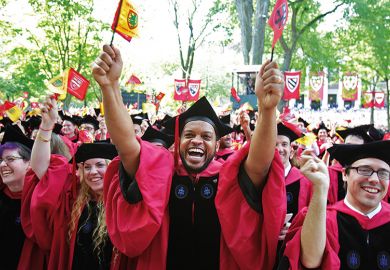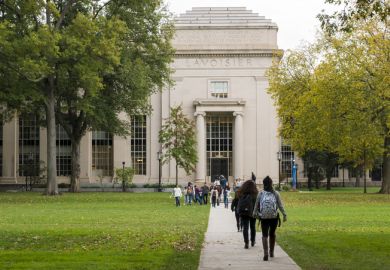On the day physicists announced last year that they had detected the gravitational waves first predicted by Albert Einstein, Martin Schmidt hesitated to share his excitement about the complex discovery with his Uber driver.
An engineer and the provost of the Massachusetts Institute of Technology (MIT), which got some of the credit for the breakthrough, Professor Schmidt thought it was too obscure to be broadly understood.
Then the driver surprised him by asking: “You mean that Einstein thing?”
It was a rare moment of university science having successfully penetrated the public imagination after being widely, accurately and admiringly reported.
In a time when voters worldwide continue to express their scepticism for science in particular, and elites in general, higher education leaders say there is an urgent need to earn much more of this kind of understanding of the value of their work.
“It’s on us to basically frame that in a way that is comprehensible and digestible,” Professor Schmidt told an audience of university marketing, communication and institutional research officials at the World Reputation Forum in Cambridge, Massachusetts, organised by Times Higher Education to coincide with the release of the World Reputation Rankings 2017.
MIT, for example, has begun producing 30- to 90-second videos about its research, Professor Schmidt said, and trains faculty in how to explain complex concepts to lay audiences.
Doing this is not just good public relations, speakers said, it’s critical to continued goodwill and the resulting funding.
“Our freedom to operate…depends on having broad public support,” said Ceri Thomas, director of public affairs and communications at the University of Oxford. “The gulf in understanding between us and a big chunk of the world around us feels dangerously wide at the moment.”
In the United States, the Trump administration is proposing large cuts in higher education research funding, including the elimination of grants that pay for laboratories, utilities, assistants and other overheads.
“These are challenges we all, institutionally, are struggling with,” said Paul Andrew, vice-president for public affairs and communications at Harvard University.
He said that Harvard is “doubling down on the people", telling stories of its students from disadvantaged backgrounds. One in five Harvard undergraduates comes from a family earning under $65,000 (£51,000) a year, Mr Andrew said.
“This is not the Harvard that is in some folks’ minds from a century ago,” he said. “If you’re a good student you can get to Harvard. It doesn’t matter what your background is or how much money you have.” (Only about one in 10 Harvard students qualifies for a federal Pell Grant, the most common measure in the United States of low socio-economic status, government figures show.)
“We need to have a much broader view of that world and invite it in if we’re going to regain...trust,” Mr Andrew said.
Doing that, the speakers said, required making clear that higher education is a force for good in people’s lives. That comes not from sharing the results of fundamental research, but their ultimate practical daily implications – in plain language.
“We are there in a million ways in drugs and therapies and technologies, but people don’t see us at the moment,” Mr Thomas said. “We have to get off the campus to reveal how we’ve been a force for good in so many lives.”
Register to continue
Why register?
- Registration is free and only takes a moment
- Once registered, you can read 3 articles a month
- Sign up for our newsletter
Subscribe
Or subscribe for unlimited access to:
- Unlimited access to news, views, insights & reviews
- Digital editions
- Digital access to THE’s university and college rankings analysis
Already registered or a current subscriber?








